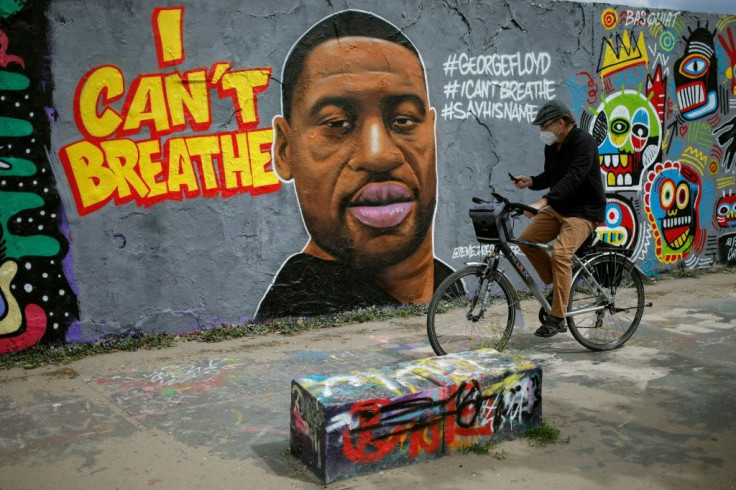George Floyd Death: Derek Chauvin May Use 'Excited Delirium' As Defense In Court
KEY POINTS
- Lawyers for Derek Chauvin are expected to make the case George Floyd died due to "excited delirium"
- The excited delirium defense is widely used in the United States to explain the deaths of suspects in police custody
- No major U.S. medical association and the World Health Organization confirm excited delirium as an actual medical condition
Lawyers defending former Minneapolis cop Derek Chauvin, who will be tried for second-degree murder in the May 25 death of George Floyd, may claim Floyd died because of a controversial diagnosis called "excited delirium syndrome," and not because their client pressed his knee down on Floyd's neck for close to nine minutes.
The U.S. National Library of Medicine outlines excited delirium (ExDS) as aggression, acute distress and sudden death.
"It is typically associated with the use of drugs that alter dopamine processing, hyperthermia, and, most notably, sometimes with death of the affected person in the custody of law enforcement," the site explained. "Subjects typically die from cardiopulmonary arrest, although the cause is debated."
Chauvin's lawyers are expected to allege Floyd died because he had an underlying heart condition, and was allegedly on meth and fentanyl at the time of his death. These conditions combined with the trauma of being arrested caused Floyd to die from a heart attack.
The excited delirium defense might be used by Chauvin's three other co-defendants, as well. Bolstering Chauvin's defense will be the final autopsy report from the Hennepin County Medical Examiner’s Office, which is almost similar to its preliminary findings released the week of Floyd's death.
The county coroner's office this week ruled Floyd’s death a homicide. It said Floyd died due to “cardiopulmonary arrest complicating law enforcement subdual, restraint, and neck compression.” It cited coronary artery disease and hypertension as contributing factors. It revealed Floyd had the painkiller fentanyl in his system and had recently used meth. It revealed Floyd tested positive for the COVID-19 coronavirus, which he seems to have contracted in early April. The coroner's report said Floyd was asymptomatic for COVID-19 at the time of his death, however.
The phrase "complicating law enforcement subdual, restraint" will be the essence of Chauvin's defense because it relates Floyd's death to ExDS.
“There’s a high probability that one or more of the officers will assert excited delirium as a defense,” Geoff Henley, a Dallas lawyer, told Slate. “When there’s criminal charges against the police, they don’t ever come empty handed.”
Henley is representing the family of a man who died in Dallas at the hands of police in 2016 in circumstances similar to Floyd’s.

Critics of ExDS contend this condition is not a legitimate cause of death. They claim American police departments use ExDS too often as an excuse after an arrest causes a suspect's death. It's a fact ExDS has been disproportionately cited as the cause of death in cases where black and Hispanic men die in police custody.
“Excited delirium, which is not a medical diagnosis, has a long history of being used to absolve law enforcement of responsibility in the death of people, especially people of color,” Dr. Homer Venters, former chief medical officer of the New York City jail system, told Slate.
ExDS has not been recognized as a genuine mental health condition by the American Medical Association (AMA), the American Psychological Association (APA), the American Psychiatric Association (APA) and the World Health Organization (WHO). It’s not in the Diagnostic and Statistical Manual of Mental Disorders (DSM) or the International Classification of Diseases (ICD).
DSM classifies mental disorders and is published by the American Psychiatric Association while ICD is a globally used diagnostic tool for epidemiology, health management and clinical purposes published by WHO.
Only American medical examiners, police departments and U.S. medical associations involved in police work continue to claim ExDS is a valid medical condition. Among the American medical organizations that consider ExDS a medical condition are the National Association of Medical Examiners and the American College of Emergency Physicians.
In 2003, the National Association for the Advancement of Colored People (NAACP) said excited delirium is used to explain the deaths of minorities more often than whites.

In June 2015, the online magazine, Slate, published an in-depth story about the use and misuse of excited delirium as a defense by American cops. It defined excited delirium as the name given to a condition "in which a person, either as a result of mental illness or protracted use of stimulants such as cocaine or methamphetamines, becomes extremely violent; hyperaggressive; and is often found naked, agitated, incoherent, feverish, and displaying extraordinary strength."
It pointed out excited delirium is a phenomenon reported most often in police encounters, requiring, on average, four officers to restrain the suspect (which is the number of cops that restrained Floyd).
In some 10% of cases, the person with excited delirium may die suddenly. The heart or breathing simply stops. The story goes on to say that "when someone dies in that agitated state and no other cause of death is found, the medical finding is that excited delirium was the cause. It accounts for approximately 250 deaths in the United States each year, with one expert speculating that about 800 cases occur each year nationwide."
© Copyright IBTimes 2024. All rights reserved.





















